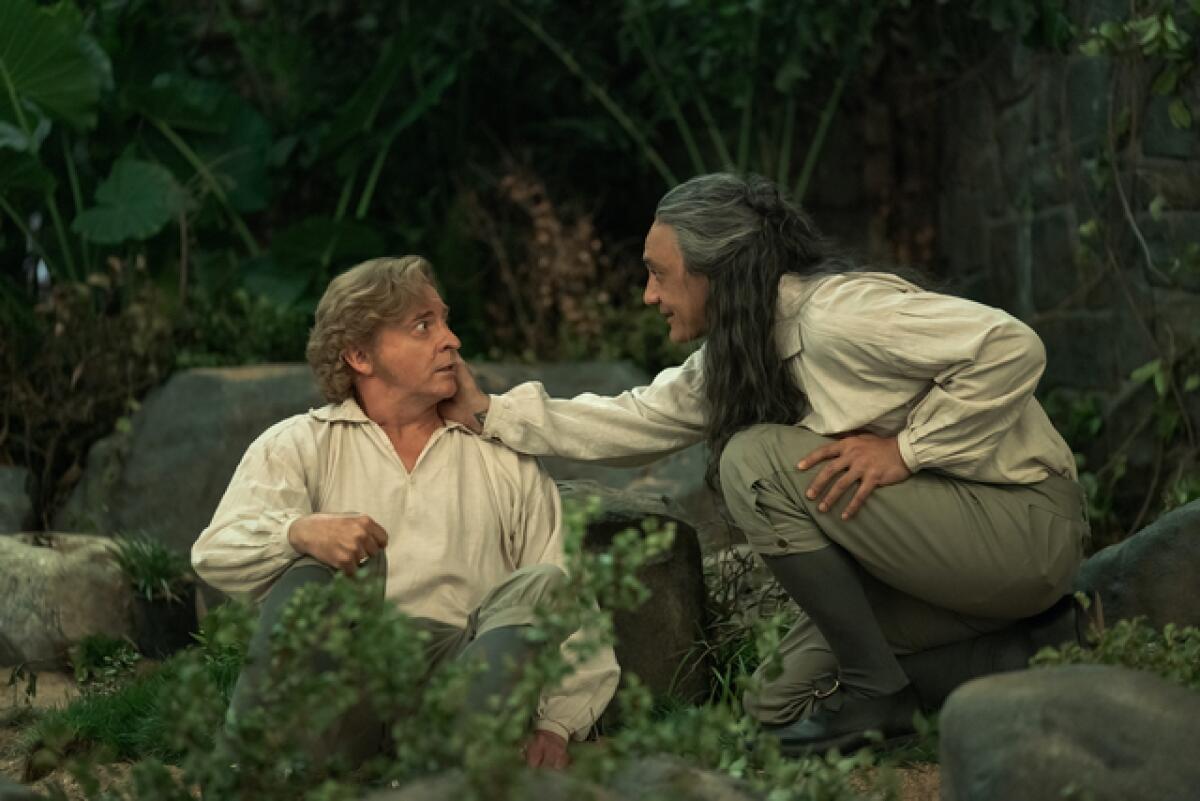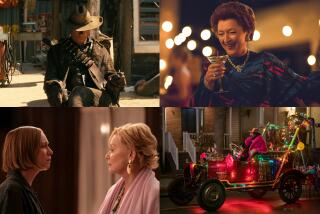Sure, ‘Our Flag Means Death’ has pirates. But it’s really a workplace relationship show

- Share via
Marginalized groups are often so desperate to see themselves onscreen that even the most mediocre entertainment, if it centers on them, will be cause for celebration. “Our Flag Means Death” could have been one such production. Instead, it has been ingeniously crafted to give its audience not only what it wants, but what some have never let themselves dream of seeing.
A shockingly good bait-and-switch, the HBO Max series starts out brightly enough as a pirate comedy full of slapstick violence. Based loosely on the true story of a member of the landed gentry named Stede Bonnet who had a midlife crisis, deserted his family and became a “gentleman pirate” in the 18th century, the show sets up Stede (Rhys Darby) as a big-hearted fool with a crew ready to mutiny at the drop of his hankie. That the crew happens to be made up of a wide range of ethnicities, sexual orientations and gender identities is certainly welcome, but initially the proceedings are all very silly. Once the dread pirate Blackbeard joins the party, however, the HBO series morphs into so much more. (Avast, spoilers ahead.)
Creator David Jenkins (“People of Earth”) learned of Bonnet from his wife and investigated further by reading Bonnet’s Wikipedia entry. He immediately thought, “Oh, this would be great; this guy’s insane,” Jenkins recalls. Bonnet’s story fell very neatly into act breaks, another plus. Jenkins read between the lines of the unusual friendship between the world-famous Blackbeard and the naïve Bonnet and realized, “It’s a relationship show. And if it’s between Stede and Blackbeard, automatically we’re questioning and subverting our idea of masculinity in this genre.
“It’s relationships in the workplace. That’s the entire concept,” Jenkins adds of “OFMD,” as the fans have dubbed it.
Taika Waititi (“Reservation Dogs”) came aboard early on as an executive producer and director of the pilot. But when he read the script for the fourth episode, he became more interested in joining the cast as well, which stands to reason; Jenkins wrote the role of Blackbeard with Waititi’s voice in mind. (And he does a great impression of Waititi’s New Zealand accent.) Jenkins kept suggesting various actors to play the part, and Waititi kept finding fault with them. “Finally, I asked, ‘Would you like to play Blackbeard?’ And Taika texted back, ‘Yes.’”
David Jenkins and Taika Waititi talk about the show’s passionate fandom, Stede and Blackbeard’s romance and what’s next for the HBO Max series.
Waititi notes he’s been acting since he was 7, but in recent years, as a prolific writer-director-producer, he has mostly taken comedic roles, such as the voice of that sweet pile of rocks Korg in the Marvel movie he directed, “Thor: Ragnarok.” Equal parts rock star, Mad Max, vulnerable boy and vicious kraken, Blackbeard has depths Waititi hasn’t plumbed in a while.
“I’ve done my fair share of dramatic acting,” he says. “But I moved away from it for a bit because it felt a bit too ‘try hard’ and fake.” Comedy let him make fun of that effort. “But then if you do enough comedy, it becomes an easy escape route from actually committing to anything meaningful.”
He was also excited to play opposite Darby, a close friend and colleague for years.
His own experiences helped him create the role. “People who don’t know me think I’m this sort of happy-go-lucky, whimsical guy who la-di-das his way through life, which is not really the case. Every human has been through pretty tough s—. Waititi also recalled the biker gangs he grew up around. “I knew a lot of those guys; no matter how hot it was during the day, they were always in leather looking cool and tough, and trying to look cool while also being uncomfortable and sweaty and angry is really hard.” He calls the part “one of the most enjoyable things I’ve done.”
The audience would concur. When Stede meets Blackbeard, sparks fly. LGBTQ viewers, long accustomed to the queerbaiting that comes with mainstream entertainment, expected more of the same here. But not this time. “OFMD” is a romance with all the trimmings — full moons, missed opportunities, petrified oranges — and, at last, a kiss and a breakthrough.
Although Waititi acknowledges it was “100% weird” to kiss his old friend, “Rhys and I just delicately took care of each other in those moments.” Throughout the shoot, “we improvised little touches on each other’s shoulders, little tugging on each other’s sleeves,” he says. “Some of it was even out of frame, but I do think it reads.”
Meanwhile, two other crew romances blossomed — between Lucius (Nathan Foad) and Black Pete (Matthew Maher) and between Oluwande (Samson Kayo) and the nonbinary Jim (played by nonbinary actor Vico Ortiz). And it just wasn’t a big deal to their fellow crew members. “OFMD” would be a truly modern take on love stories, except real modern life isn’t anywhere near as accepting as what’s happening aboard the Revenge. The only objector is Izzy Hands (Con O’Neill), Blackbeard’s first mate, and that’s because the poor man clearly harbors a terrible crush on his boss.
But the course of love, and badly captained pirate ships, does not run smoothly.
“If you’re watching a romance that doesn’t break your heart, I don’t think that’s going to be a very good romance,” Jenkins says.
This is pain on the level of a boombox held aloft by John Cusack. Viewers have been wrecked and yet are profusely grateful for the respect shown to the relationships. And Jenkins and the cast have been overwhelmed by the fans, whom they affectionately call the crew. Followers on social media post everything from art to analysis. Some theories are so accurate “it’s like seeing a beat for beat, unintentional re-creation of a conversation we had in the writers room,” Jenkins says.
“OFMD” became the most-streamed new program for seven weeks running after its finale aired on March 24, according to data analytics firm Parrot Analytics. HBO renewed it for a second season just last week.
But what of Lucius, whom Blackbeard tossed overboard in a fit of rage? Jenkins shrugs. “Pirating’s a rough business.” That will not be born. Even Waititi voiced his objections: “Lucius is adored, he’s loved! And David’s like, ‘What are you talking about, he got pushed off a boat.’”
The show fires on all cannons. One scene in Episode 8 finds Stede and Blackbeard, bested by their foes, lying face to face on the deck. Set to Fleetwood Mac’s “The Chain,” it is a breathtaking feat of direction (by the duo Bert and Bertie), editing and music. But the literal kicker at the end is when Blackbeard moves his leather-booted foot to touch Stede’s. Waititi came up with the now-beloved moment, Jenkins says. “I knew I wanted that song, I knew which beats I wanted where. But that little improvised foot touch is like a release valve or something that helps that already fantastic sequence work. It punctuates it in such a good way. It’s so sweet.”
But not treacly. Brutality and silly gags are as intrinsic to the show’s tone as the tenderness. “I think what makes Stede special, and not just an idiot, is he’s bringing this kind of gentleness to a Hieronymus Bosch painting of violence,” Jenkins says. “So those flavors need to alternate and balance each other out.”
More to Read
From the Oscars to the Emmys.
Get the Envelope newsletter for exclusive awards season coverage, behind-the-scenes stories from the Envelope podcast and columnist Glenn Whipp’s must-read analysis.
You may occasionally receive promotional content from the Los Angeles Times.








